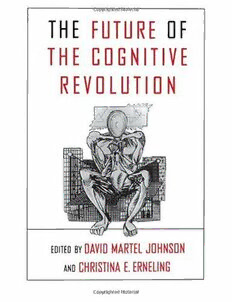Download The Future of the Cognitive Revolution PDF Free - Full Version
Download The Future of the Cognitive Revolution by David Johnson, Christina Erneling in PDF format completely FREE. No registration required, no payment needed. Get instant access to this valuable resource on PDFdrive.to!
About The Future of the Cognitive Revolution
The basic idea of the particular way of understanding mental phenomena that has inspired the ''cognitive revolution'' is that, as a result of certain relatively recent intellectual and technological innovations, informed theorists now possess a more powerfully insightful comparison or model for mind than was available to any thinkers in the past. The model in question is that of software, or the list of rules for input, output, and internal transformations by which we determine and control the workings of a computing machine's hardware. Although this comparison and its many implications have dominated work in the philosophy, psychology, and neurobiology of mind since the end of the Second World War, it now shows increasing signs of losing its once virtually unquestioned preeminence. Thus we now face the question of whether it is possible to repair and save this model by means of relatively inessential ''tinkering'', or whether we must reconceive it fundamentally and replace it with something different. In this book, twenty-eight leading scholars from diverse fields of ''cognitive science''-linguistics, psychology, neurophysiology, and philosophy- present their latest, carefully considered judgements about what they think will be the future course of this intellectual movement, that in many respects has been a watershed in our contemporary struggles to comprehend that which is crucially significant about human beings. Jerome Bruner, Noam Chomsky, Margaret Boden, Ulric Neisser, Rom Harre, Merlin Donald, among others, have all written chapters in a non-technical style that can be enjoyed and understood by an inter-disciplinary audience of psychologists, philosophers, anthropologists, linguists, and cognitive scientists alike.
Detailed Information
| Author: | David Johnson, Christina Erneling |
|---|---|
| Publication Year: | 1997 |
| ISBN: | 9780195356045 |
| Pages: | 412 |
| Language: | English |
| File Size: | 25.589 |
| Format: | |
| Price: | FREE |
Safe & Secure Download - No registration required
Why Choose PDFdrive for Your Free The Future of the Cognitive Revolution Download?
- 100% Free: No hidden fees or subscriptions required for one book every day.
- No Registration: Immediate access is available without creating accounts for one book every day.
- Safe and Secure: Clean downloads without malware or viruses
- Multiple Formats: PDF, MOBI, Mpub,... optimized for all devices
- Educational Resource: Supporting knowledge sharing and learning
Frequently Asked Questions
Is it really free to download The Future of the Cognitive Revolution PDF?
Yes, on https://PDFdrive.to you can download The Future of the Cognitive Revolution by David Johnson, Christina Erneling completely free. We don't require any payment, subscription, or registration to access this PDF file. For 3 books every day.
How can I read The Future of the Cognitive Revolution on my mobile device?
After downloading The Future of the Cognitive Revolution PDF, you can open it with any PDF reader app on your phone or tablet. We recommend using Adobe Acrobat Reader, Apple Books, or Google Play Books for the best reading experience.
Is this the full version of The Future of the Cognitive Revolution?
Yes, this is the complete PDF version of The Future of the Cognitive Revolution by David Johnson, Christina Erneling. You will be able to read the entire content as in the printed version without missing any pages.
Is it legal to download The Future of the Cognitive Revolution PDF for free?
https://PDFdrive.to provides links to free educational resources available online. We do not store any files on our servers. Please be aware of copyright laws in your country before downloading.
The materials shared are intended for research, educational, and personal use in accordance with fair use principles.

